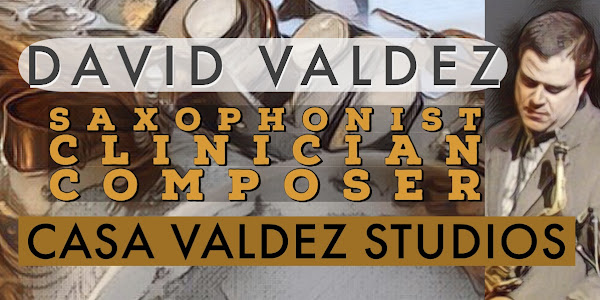 The harmonic major scale (simply a major with a flat sixth) is a relatively new addition to Jazz improvisation. It has an interesting exotic sound and can be a important element of a modern Jazz musician's vocabulary.
The harmonic major scale (simply a major with a flat sixth) is a relatively new addition to Jazz improvisation. It has an interesting exotic sound and can be a important element of a modern Jazz musician's vocabulary.Music theory always lags significantly behind what musicians are actually playing on the streets. There are many useful "exotic" scales like the harmonic major (some of which are only one or two notes different the handful of scales that most Jazz musicians are taught in schools) that have been used by players for years without showing up in any Jazz theory books. Saxophonist Matt Otto is bringing the world of Jazz theory up to speed with his new book on the harmonic major scale entitled Modern Jazz Vocabulary Vol.1.
Here's what Otto has to say about his book:
I finally finished my first book on jazz improvisation. After years of practice journals and outlines for the ultimate jazz tome, I finally realized that I’m not Mick Goodrick or Hal Crook (no matter how much I practice) and in general, I always liked a music book with a fairly narrow focus; with “baroque counterpoint” for example, you know what to expect. After much deliberation, I decided to take one concept that inspires me constantly, that I really enjoy practicing, and write a book about that. After digging through my practice logs, and organizing boxes of semi-legible manuscript, I found a lot of material about creating an original, non-cliched, modern vocabulary, as well as a lot of melodic examples from the harmonic major scale (an Ionian scale with a b13). So, I ended up writing a book on how to develop an original melodic vocabulary for improvisation using specifically the harmonic major scale.
The book outlines the various ways I’ve come up with to practice scales, melodies and harmonies while focusing on developing an original melodic vocabulary. Included are not only a lot of lines, melodies and “licks” (if you will), but the methodology I used to create them. This workbook leaves a lot of space for musical exploration and creation, although there’s plenty of written material if you just want to play through it and glean a few new ideas that speak to you. The following table of c
ontents will give you an idea of just how comprehensive this publication is. I’ve put a lot of time and thought into this book and I really believe my work can benefit other musicians. At $11.95, I think you’ll find it a good investment!
In his book, Otto has created a template for what hopefully will be an entire series on the topic of applying different exotic scales to Jazz improvisation. The structure of this book is very well thought out and an ambitious student could easily use the template of the chapters to develop an entire Jazz vocabulary based on exotic scales. If fact, after reading Otto's book I put together an interesting lesson plan for my own students using this same template.
The chapters in this book are as follows:
- Modes and Chords
- Arpeggiated Voicings
- Rhythmic Displacement
- ii-7 V7 I Maj
- V7 i minor
- Melodic Sequence
- Random Intervals
- Diatonic Cycles
- Triad Pairs
- Combination
The modes of the melodic major scale can open up new melodic ideas and expand the vocabulary of the modern Jazz musician. This book is a innovative new addition to the world of Jazz theory, there is simply nothing else out there like it. It has given me valuable teaching material for my students as well as giving me something interesting to work on myself. I look forward to seeing future volumes of Matt Otto's Modern Jazz Vocabulary.








1 comment:
It't funny how this scale is over looked in jazz theory education.
Harmonic major!!! yey!!
It works really well over diminished chords and Dom b9 chords I think! :)
Post a Comment